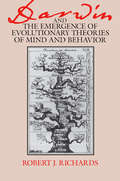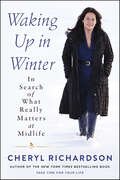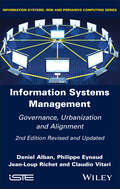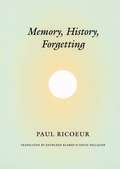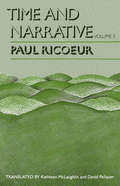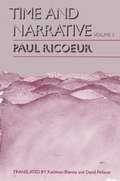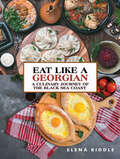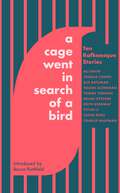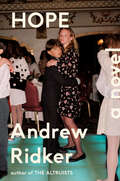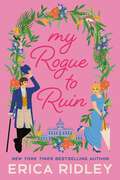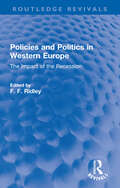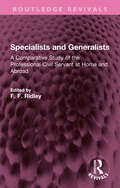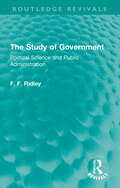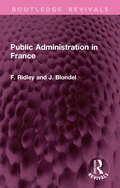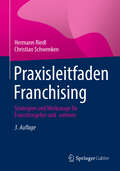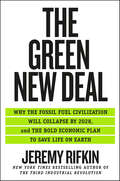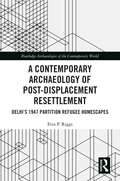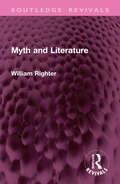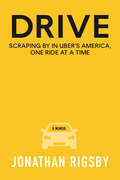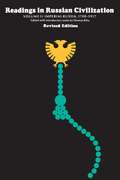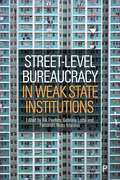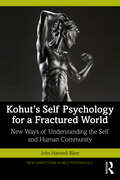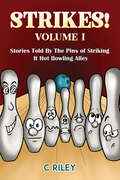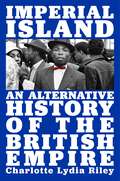- Table View
- List View
Darwin and the Emergence of Evolutionary Theories of Mind and Behavior (Science And Its Conceptual Foundations Ser.)
by Robert J. RichardsWith insight and wit, Robert J. Richards focuses on the development of evolutionary theories of mind and behavior from their first distinct appearance in the eighteenth century to their controversial state today. Particularly important in the nineteenth century were Charles Darwin's ideas about instinct, reason, and morality, which Richards considers against the background of Darwin's personality, training, scientific and cultural concerns, and intellectual community. Many critics have argued that the Darwinian revolution stripped nature of moral purpose and ethically neutered the human animal. Richards contends, however, that Darwin, Herbert Spencer, and their disciples attempted to reanimate moral life, believing that the evolutionary process gave heart to unselfish, altruistic behavior. "Richards's book is now the obvious introduction to the history of ideas about mind and behavior in the nineteenth century."—Mark Ridley, Times Literary Supplement "Not since the publication of Michael Ghiselin's The Triumph of the Darwinian Method has there been such an ambitious, challenging, and methodologically self-conscious interpretation of the rise and development and evolutionary theories and Darwin's role therein."—John C. Greene, Science "His book . . . triumphantly achieves the goal of all great scholarship: it not only informs us, but shows us why becoming thus informed is essential to understanding our own issues and projects."—Daniel C. Dennett, Philosophy of Science
Waking Up in Winter: In Search of What Really Matters at Midlife
by Cheryl RichardsonInternationally recognized coach and New York Times bestselling author Cheryl Richardson has toured the world empowering others to make lasting change. But when Richardson’s own life no longer worked as it once had, a persistent, inner voice offered unmistakable guidance: it was time to reevaluate her life to uncover what really mattered.Waking Up in Winter is the candid and revelatory account of how at midlife, Richardson found renewed contentment and purpose through a heroic, inward journey. The unfolding story, told through intimate journal entries, follows Richardson from the first, gentle nudges of change to a thoughtfully reimagined life – a soulful, spring awakening.With an experienced coach’s intuition and an artist’s eye, Richardson reexamines everything – her marriage, her work, her friendships, and her priorities – gracefully shedding parts of the self that no longer serve along the way. In the end, she not only discovers what really matters at midlife, she invites readers to join her in the inquiry process by providing thought-provoking questions designed to usher them through their own season of transformation. Offering up Richardson’s most powerful teaching tool yet – her own life – Waking Up in Winter takes readers on a brave, spiritual adventure that shows us all how to live a more authentic and meaningful life.
Information Systems Management: Governance, Urbanization and Alignment
by Jean-Loup Richet Daniel Alban Philippe Eynaud Claudio VitariInformation Systems Management is intended to sensitize the heads of organizations to the issues raised by information systems (IS). Through its pedagogical presentation, this book ensures that issues related to IS are not left solely to the experts in the field. This book combines and analyzes three key concepts in IS science: governance, urbanization and alignment. While governance implies the implementation of a certain number of means, bodies and procedures to manage IS more effectively, urbanization involves visualization methods to enable the manager to take into account the different levels of the organization of an IS and their coherence. Finally, alignment assesses the ability of the IS to make a significant contribution to the organization's strategy.
Memory, History, Forgetting
by Paul RicoeurWhy do major historical events such as the Holocaust occupy the forefront of the collective consciousness, while profound moments such as the Armenian genocide, the McCarthy era, and France's role in North Africa stand distantly behind? Is it possible that history "overly remembers" some events at the expense of others? A landmark work in philosophy, Paul Ricoeur's Memory, History, Forgetting examines this reciprocal relationship between remembering and forgetting, showing how it affects both the perception of historical experience and the production of historical narrative.Memory, History, Forgetting, like its title, is divided into three major sections. Ricoeur first takes a phenomenological approach to memory and mnemonical devices. The underlying question here is how a memory of present can be of something absent, the past. The second section addresses recent work by historians by reopening the question of the nature and truth of historical knowledge. Ricoeur explores whether historians, who can write a history of memory, can truly break with all dependence on memory, including memories that resist representation. The third and final section is a profound meditation on the necessity of forgetting as a condition for the possibility of remembering, and whether there can be something like happy forgetting in parallel to happy memory. Throughout the book there are careful and close readings of the texts of Aristotle and Plato, of Descartes and Kant, and of Halbwachs and Pierre Nora. A momentous achievement in the career of one of the most significant philosophers of our age, Memory, History, Forgetting provides the crucial link between Ricoeur's Time and Narrative and Oneself as Another and his recent reflections on ethics and the problems of responsibility and representation.“His success in revealing the internal relations between recalling and forgetting, and how this dynamic becomes problematic in light of events once present but now past, will inspire academic dialogue and response but also holds great appeal to educated general readers in search of both method for and insight from considering the ethical ramifications of modern events. . . . It is indeed a master work, not only in Ricoeur’s own vita but also in contemporary European philosophy.”—Library Journal “Ricoeur writes the best kind of philosophy—critical, economical, and clear.”— New York Times Book Review
Time and Narrative, Volume 2
by Paul RicoeurIn volume 1 of this three-volume work, Paul Ricoeur examined the relations between time and narrative in historical writing. Now, in volume 2, he examines these relations in fiction and theories of literature. Ricoeur treats the question of just how far the Aristotelian concept of "plot" in narrative fiction can be expanded and whether there is a point at which narrative fiction as a literary form not only blurs at the edges but ceases to exist at all. Though some semiotic theorists have proposed all fiction can be reduced to an atemporal structure, Ricoeur argues that fiction depends on the reader's understanding of narrative traditions, which do evolve but necessarily include a temporal dimension. He looks at how time is actually expressed in narrative fiction, particularly through use of tenses, point of view, and voice. He applies this approach to three books that are, in a sense, tales about time: Virgina Woolf's Mrs. Dalloway; Thomas Mann's Magic Mountain; and Marcel Proust's Remembrance of Things Past. "Ricoeur writes the best kind of philosophy—critical, economical, and clear."—Eugen Weber, New York Times Book Review "A major work of literary theory and criticism under the aegis of philosophical hermenutics. I believe that . . . it will come to have an impact greater than that of Gadamer's Truth and Method—a work it both supplements and transcends in its contribution to our understanding of the meaning of texts and their relationship to the world."—Robert Detweiler, Religion and Literature "One cannot fail to be impressed by Ricoeur's encyclopedic knowledge of the subject under consideration. . . . To students of rhetoric, the importance of Time and Narrative . . . is all too evident to require extensive elaboration."—Dilip Parameshwar Gaonkar, Quarterly Journal of Speech
Time and Narrative, Volume 3
by Paul RicoeurIn the first two volumes of this work, Paul Ricoeur examined the relations between time and narrative in historical writing, fiction, and theories of literature. This final volume, a comprehensive reexamination and synthesis of the ideas developed in volumes 1 and 2, stands as Ricoeur's most complete and satisfying presentation of his own philosophy. Ricoeur's aim here is to explicate as fully as possible the hypothesis that has governed his inquiry, namely, that the effort of thinking at work in every narrative configuration is completed in a refiguration of temporal experience. To this end, he sets himself the central task of determing how far a poetics of narrative can be said to resolve the "aporias"—the doubtful or problematic elements—of time. Chief among these aporias are the conflicts between the phenomenological sense of time (that experienced or lived by the individual) and the cosmological sense (that described by history and physics) on the one hand and the oneness or unitary nature of time on the other. In conclusion, Ricoeur reflects upon the inscrutability of time itself and attempts to discern the limits of his own examination of narrative discourse. "As in his previous works, Ricoeur labors as an imcomparable mediator of often estranged philosophical approaches, always in a manner that compromises neither rigor nor creativity."—Mark Kline Taylor, Christian Century "In the midst of two opposing contemporary options—either to flee into ever more precious readings . . . or to retreat into ever more safe readings . . . —Ricoeur's work offers an alternative option that is critical, wide-ranging, and conducive to new applications."—Mary Gerhart, Journal of Religion
Eat Like a Georgian – a Culinary Journey of the Black Sea Coast
by Elena RiddleWhile not everyone has the chance to voyage to far-off lands and indulge in native delicacies, it's often that these world cuisines find their way to us. Whether through a local restaurant, a takeaway order, or a homemade culinary adventure, we’ve become familiar with the flavours of Italy, China, or India. But what about venturing into the unexplored? How about diving into the culinary treasures of a small country, once the eastern frontier of the Roman Empire, boasting a wine-making legacy spanning millennia? Welcome to the rich cuisine of Georgia! Explore its unique recipes, crafted with easily attainable ingredients, which might just find a permanent spot in your culinary rotation. Ready to tantalize your taste buds? Why not go Georgian tonight?
A Cage Went in Search of a Bird: Ten Kafkaesque Stories
by Keith Ridgway Helen Oyeyemi Joshua Cohen Ali Smith Yiyun Li Naomi Alderman Elif Batuman Tommy Orange Charlie Kaufman Leone RossA collection of brand-new short stories written by prize-winning, bestselling writers and inspired by Kafka - published to commemorate the centenary of his death*Chosen as a 2024 highlight in the Guardian, the Financial Times, the Daily Mail, New Statesman, Esquire and the New European*Franz Kafka is widely regarded as one of the great geniuses of twentieth-century literature. What happens when some of the most original literary minds of today take an idea, a mood or a line from his work and use it to spark something new?From a future society who ask their AI servants to construct a giant tower to reach God; to a flat hunt that descends into a comically absurd bureaucratic nightmare; to a population experiencing a wave of unbearable, contagious panic attacks, these ten specially commissioned stories are by turns mind-bending, funny, unsettling and haunting. Inspired by the visionary imagination of a writer working one hundred years ago, they speak powerfully to the strangeness of being alive today.
A Cage Went in Search of a Bird: Ten Kafkaesque Stories
by Keith Ridgway Helen Oyeyemi Joshua Cohen Ali Smith Yiyun Li Naomi Alderman Elif Batuman Tommy Orange Charlie Kaufman Leone RossA collection of brand-new short stories written by prize-winning, bestselling writers and inspired by Kafka - published to commemorate the centenary of his death*Chosen as a 2024 highlight in the Guardian, the Financial Times, the Daily Mail, New Statesman, Esquire and the New European*Franz Kafka is widely regarded as one of the great geniuses of twentieth-century literature. What happens when some of the most original literary minds of today take an idea, a mood or a line from his work and use it to spark something new?From a future society who ask their AI servants to construct a giant tower to reach God; to a flat hunt that descends into a comically absurd bureaucratic nightmare; to a population experiencing a wave of unbearable, contagious panic attacks, these ten specially commissioned stories are by turns mind-bending, funny, unsettling and haunting. Inspired by the visionary imagination of a writer working one hundred years ago, they speak powerfully to the strangeness of being alive today.
Hope: A Novel
by Andrew RidkerA New York Times Editors' ChoiceA Boston Globe, Forward, and Times of Israel Best Book of the Year&“Riotous. . . . Hilarious . . . impeccably written . . . . Intelligent, bighearted, spew-your-gefilte-fish-funny.&” —The New York Times Book Review &“A writer with this much talent can take his readers anywhere.&” —The Washington Post&“Painfully funny. . . . This rivals Taffy Brodesser-Akner&’s Fleishman is in Trouble in its pitch-perfect portrayal of Jewish American life.&” —Publishers Weekly (starred review)&“A comedy of (bad) manners. . . . Engaging.&” —The Boston GlobeA hilarious and heartfelt novel about a seemingly perfect family in an era of waning American optimism, from the acclaimed author of The AltruistsThe year is 2013 and the Greenspans are the envy of Brookline, Massachusetts, an idyllic (and idealistic) suburb west of Boston. Scott Greenspan is a successful physician with his own cardiology practice. His wife, Deb, is a pillar of the community who spends her free time helping resettle refugees. Their daughter, Maya, works at a distinguished New York publishing house and their son, Gideon, is preparing to follow in his father&’s footsteps. They are an exceptional family from an exceptional place, living in exceptional times.But when Scott is caught falsifying blood samples at work, he sets in motion a series of scandals that threatens to shatter his family. Deb leaves him for a female power broker; Maya rekindles a hazardous affair from her youth; and Gideon drops out of college to go on a dangerous journey that will put his principles to the test.From Brookline to Berlin to the battlefields of Syria, Hope follows the Greenspans over the course of one tumultuous year as they question, and compromise, the values that have shaped their lives. But in the midst of their disillusionment, they&’ll discover their own capacity for resilience, connection, and, ultimately, hope.
My Rogue to Ruin (The Wild Wynchesters #4)
by Erica RidleyThis fabulously fun Regency romp featuring witty banter, a dash of mystery, lots of kissing, and an adorable hedgehog, will bring all the adventure you've been waiting for! Marjorie Wynchester has always let her siblings take the lead when it comes to planning their investigations. But someone in London is trying to pass off counterfeits, and this time she's the only one with the skill needed to find the culprit. Soon, all the evidence leads her straight to Lord Adrian Webb. Adrian is a roguish scoundrel of the first order, but he never meant to get caught up in a forgery scheme. Especially one that&’s snowballed out of control. Now a blackmailer is out to ruin him, and the most alluring woman he's ever met is trying to put him behind bars. Every time Marjorie thinks she has Adrian figured out, her assumptions turn on their head. He&’s a heartless scoundrel. A loyal brother. A smooth liar. A good kisser. Er…wait… Is winning her affections just one more attempt to avoid the law? Or is it possible he&’s not such a rogue after all?
Policies and Politics in Western Europe: The Impact of the Recession (Routledge Revivals)
by F. F. RidleyThe problems of inflation, unemployment and economic stagnation are shared by all industrialised countries, but government response to them varies from state to state. This book, originally published in 1984, examines the effect of the recession of the 1980s on policy-making and policy content in Britain, France, Germany, Italy and Sweden. The author identifies the particular problems that face each country and explains why certain policies were adopted and how recession influenced policy-making. Through comparative analysis, the book shows how each government’s policy-making processes responded to the economic and social pressures created by a crisis in the world economy
Specialists and Generalists: A Comparative Study of the Professional Civil Servant at Home and Abroad (Routledge Revivals)
by F. F. RidleyOriginally published in 1968, this book provides surveys of the Australian, French, German, Swedish and American systems of public administration. Previously unpublished material on the professional classes in Britain was made available which filled a gap in the (then) available textbooks on British government. A concluding chapter deals with the wider aspects of the generalist versus specialist problem, an original contribution to administrative theory. The book will be of interest to students of politics and government and the student of comparative administration, as well as to those concerned with civil service reform
The Study of Government: Political Science and Public Administration (Routledge Revivals)
by F. F. RidleyOriginally published in 1975, this book advocates a certain approach to the study of government: the focus should be institutional, the method comparative and the level practical. The book divides into 2 sections on political science and public administration but the themes are common, as is much of the subject matter. Chapters on the institutional and comparative approach are intended to show how political institutions are often designed to reflect political theories, how institutional engineering may take place and how lessons for domestic reform may be learnt from foreign experience. The second section looks at the state of public administration studies in Britain, the nature of the subject, drawing on the work of earlier theorists, the role of the universities and the civic contribution such study can make
Public Administration in France (Routledge Revivals)
by F. F. Ridley J. BlondelOriginally published in 1964, this book was an important addition to the growing field of comparative government and administration. This book covers the organisation of the French cabinet, the structure and functions of government departments and of local authorities, the civil service, the police, the judiciary and public enterprise. There are also chapters on economic planning, the administration of social services and of the educational system. The book explains the spirit as well as the mechanism of the French administrative system, the principles that underly it and the wider background against which it is set
Praxisleitfaden Franchising: Strategien und Werkzeuge für Franchisegeber und -nehmer
by Hermann Riedl Christian SchwenkenFranchisesysteme verstehen, systematisch aufbauen und für alle Beteiligten zum Erfolg machen ist ein komplexes Unterfangen. Wie das geht, erfahren Sie in diesem Buch. Franchisegeber wie auch Franchisenehmer erhalten wertvolle Strategien und Tools für das Tagesgeschäft und Antworten auf grundlegende Fragen: Wie können verschiedene Franchisesysteme aus den unterschiedlichsten Perspektiven bewertet werden? Welche Rolle spielen Regelwerke und deren Inhalte dabei? Wie funktionieren die verschiedenen Prozesse und wie kann die Zusammenarbeit erfolgreich verlaufen? Wie können Marketingmaßnahmen im Franchisesystem gesteuert werden?Die Autoren liefern wertvolle und direkt in den Arbeitsalltag integrierbare Werkzeuge und Mustervorlagen u. a. zu Mitbewerberanalysen, Dienstplänen, Personalaudits, Tages- und Umsatzplanungen. Die dritte Auflage wurde überarbeitet und um aktuelle Veränderungen in der Rechtsprechung sowie die Themen Lizenzvertrag versus Franchisevertrag, Gebietsschutz und Scheinselbstständigkeit ergänzt.Ein unverzichtbarer Leitfaden für alle, die praxisnahe Informationen zum Thema Franchising suchen und sofort anwenden wollen.
The Green New Deal: Why the Fossil Fuel Civilization Will Collapse by 2028, and the Bold Economic Plan to Save Life on Earth
by Jeremy RifkinAn urgent plan to confront climate change, transform the American economy, and create a green post-fossil fuel culture.A new vision for America’s future is quickly gaining momentum. Facing a global emergency, a younger generation is spearheading a national conversation around a Green New Deal and setting the agenda for a bold political movement with the potential to revolutionize society. Millennials, the largest voting bloc in the country, are now leading on the issue of climate change.While the Green New Deal has become a lightning rod in the political sphere, there is a parallel movement emerging within the business community that will shake the very foundation of the global economy in coming years. Key sectors of the economy are fast-decoupling from fossil fuels in favor of ever cheaper solar and wind energies and the new business opportunities and employment that accompany them. New studies are sounding the alarm that trillions of dollars in stranded fossil fuel assets could create a carbon bubble likely to burst by 2028, causing the collapse of the fossil fuel civilization. The marketplace is speaking, and governments will need to adapt if they are to survive and prosper.In The Green New Deal, New York Times bestselling author and renowned economic theorist Jeremy Rifkin delivers the political narrative and economic plan for the Green New Deal that we need at this critical moment in history. The concurrence of a stranded fossil fuel assets bubble and a green political vision opens up the possibility of a massive shift to a post-carbon ecological era, in time to prevent a temperature rise that will tip us over the edge into runaway climate change. With twenty-five years of experience implementing Green New Deal–style transitions for both the European Union and the People’s Republic of China, Rifkin offers his vision for how to transform the global economy and save life on Earth.
A Contemporary Archaeology of Post-Displacement Resettlement: Delhi’s 1947 Partition Refugee Homescapes (Routledge Archaeologies of the Contemporary World)
by Erin P. RiggsThis book explores the archaeology of the 1947 Partition, the largest mass migration in human history, and the resulting resettlement of half a million refugees in Delhi, India’s capital city.Interweaving material analysis with oral history collection and archival sources, this book considers how Delhi’s Partition refugees have interacted with the city's built landscapes through time. It demonstrates how government-built refugee colonies, influenced by both socialist and capitalist design philosophies, provided an effective and adaptable setting for resettlement. In contrast, it illustrates how Delhi’s pre-Partition landscapes—including ‘evacuee properties’ vacated by out-migrating Muslims and sections of the planned, colonial capital—have proven more problematic venues for rehousing. In these contexts, refugee families navigated life within homes shaped by past occupants and colonial-era wealth disparities. The book highlights that despite such difficulties and the unprecedented scale of Partition’s impact on Delhi, refugees have obtained an impressive degree of material success and social acceptance in the city. This example challenges assumptions about the aid-dependency of refugee communities, the potential effectiveness of public housing, and the mutability of national belonging.This interdisciplinary case study will be of interest to scholars in varied fields of study, including archaeology, architectural history, cultural anthropology, human geography, and South Asian studies.
Myth and Literature (Routledge Revivals)
by William RighterFirst published in 1975, Myth and Literature considers three points at which the concept of myth has entered modern literary imagination: the use of myth – or atleast their understanding of myth -- as a creative opening by modern writers, its exploration by critics as an interpretive device, and the analogy between certain ‘sense-making’ functions of ‘myth’, ‘fiction’ and literature itself. All three of these roles show the gradual movement from a point of precise demand to a diffuse and variable concept which is more pervasive because less distinct. The paradox of myth is shown to lie in its simultaneity of its corruption with the growth of its power over the modern literary mind. This book will be of interest to students of literature and history.
Drive: Scraping By in Uber's America, One Ride at a Time
by Jonathan RigsbyOne father, three years, and thousands of rides Poverty, By America meets Maid in this dad&’s darkly humorous yet humanizing story of working long hours and late nights behind the wheel as a rideshare driverJonathan Rigsby spends his days as a crime intelligence analyst and his nights as an Uber driver. Reeling from his divorce and struggling to pay rent while caring for his autistic son, Rigsby became a rideshare driver, joining the millions of people with a side hustle just to make ends meet.With a compelling blend of honesty and sardonic wit, Rigsby invites readers into his car to reveal the harsh reality of gig work for so many: grueling hours, living paycheck to paycheck, and hoping to avoid disaster long enough to prepare for the next bill. Along the way, he showcases the humor and humanity in the private moments of vulnerability that happen when people are left alone with a stranger — from the amusing tales of drunk college students to a passenger getting sick on the dashboard, a mother expressing distress about her son&’s addiction, and a violent encounter on the job.Unflinching and raw, Drive exposes an ugly truth that hides in the gaudy background of the American dream: you can do everything right and still fail. Buckle up.
Readings in Russian Civilization Volume II: Imperial Russia, 1700–1917 (None Ser.)
by Thomas Riha"This new and enlarged version of Readings in Russian Civilization is the result of fairly extensive revisions. There are now 72 instead of 64 items; 20 of the selections are new. The first volume has undergone the least change with 3 new items, of which 2 appear in English for the first time. In the second volume there are 6 new items; all of them appear in English for the first time. The third volume has undergone the greatest revision, with 11 new items, of which 6 are newly translated from the Russian. It is the editor's hope that items left out in the new edition will not be sorely missed, and that the new selections will turn out to be useful and illuminating. The aim, throughout, has been to cover areas of knowledge and periods which had been neglected in the first edition, and to include topics which are important in the study of the Russian past and present. "The bibliographical headnotes have been enlarged, with the result that there are now approximately twice as many entries as in the old edition. New citations include not only works which have appeared since 1963, but also older books and articles which have come to the editor's attention."—From the Editor's Preface ". . . a judicious combination of seminal works and more recent commentaries that achieves the editor's purpose of stimulating curiosity and developing a point of view."—C. Bickford O'Brien, The Russian Review "These three volumes cover quite well the main periods of Russian civilization. The choice of the articles and other material is made by a competent and unbiased scholar."—Ivan A. Lopatin, Professor of Asian and Slavic Studies, University of Southern California
Street-Level Bureaucracy in Weak State Institutions
by Rik Peeters, Gabriela Lotta, and Fernando Nieto-MoralesIn this book, street-level bureaucracy scholars from South Asia, sub-Saharan Africa, the Middle East, and Latin America analyse the conditions that shape frontline work and citizens´ everyday experience of the state. Institutional factors such as political clientelism, resource scarcity, social inequality, job insecurity, and systemic corruption affect the way street-level bureaucrats enforce rules and implement policies. Inadvertently, they end up implementing inequities in citizens’ access to rights and services — despite efforts to repair organisational deficiencies and broker relations between vulnerable citizens and a distant state. This book illuminates these realities and challenges and provides unique insights into critical themes such as resource scarcities, bureaucratic corruption, control practices, and the complexities of dealing with vulnerable population groups.
Kohut's Self Psychology for a Fractured World: New Ways of Understanding the Self and Human Community (New Directions in Self Psychology)
by John Hanwell RikerDrawing from Kohut's conceptualisation of self, Riker sets out how contemporary America's formulation of persons as autonomous, self-sufficient individuals is deeply injurious to the development of a vitalizing self-structure—a condition which lies behind much of the mental illness and social malaise of today's world.By carefully attending to Kohut's texts, Riker explains the structural, functional, and dynamic dimensions of Kohut's concept of the self. He creatively extends this concept to show how the self can be conceived of as an erotic striving for connectedness, beauty, and harmony, separate from the ego. Riker uses this distinction to reveal how social practices of contemporary American society foster skills and traits to advance the aims of the ego for power and control, but tend to suppress the needs of the self to authentically express its ideals and connect with others. The book explores the impact that this view can have on clinical practice, and concludes by imaginatively constructing an ideal self-psychological society, using Plato's Republic as a touchstone.Informed by self psychology and philosophy, this book is essential reading for psychoanalysts, psychotherapists and philosophers, seeking to revisit and revise constructions of both self and humanity.
Strikes! – Volume I: Stories Told By The Pins of Striking It Hot Bowling Alley
by C Riley&‘Striking It Hot Bowling Alley&’ sits on top of a magical city where the residents are bowling pins. Most either work, or did work, at the bowling alley. They have had many adventures, from competitions to theme nights, and are eager to share them with you. Things were scary at times, but fun was always had in the end. Each story is told by a separate pin as they sit in a lounge just under the pin box. They go there to relax after a long day while enjoying music and drinks.Disclaimer: These pins are alive, but only those who believe can see it!
Imperial Island: An Alternative History of the British Empire
by Charlotte Lydia RileyThis riveting new history tells the story of Britain’s journey from imperial power to a nation divided—one that alternately welcomes and excludes former imperial subjects and has been utterly transformed by them.In the turbulent years since the outbreak of World War II, Britain has gone from an imperial power whose dominion extended over a quarter of the world’s population to an island nation divorced from Europe. After the war, as independence movements gained momentum, former imperial subjects started making their way to her soggy shores. Would these men and women of different races, cultures, and faiths be accepted as British, or would they forever be seen as outsiders? In this deeply intimate retelling of the United Kingdom’s transformation from empire to island nation, Charlotte Lydia Riley shows that empire haunts every aspect of life in modern Britain.From race riots to the Notting Hill Carnival, from the Suez Crisis to the wars in Iraq and Afghanistan, from the Monday Club and Enoch Powell’s defiant calls to protect England’s racial purity to Band Aid, the Spice Girls, and Brick Lane, the imperial mindset has dominated Britain’s relationship with itself and the world. The ghosts of empire are to be found, too, in anti-immigrant rhetoric and royal memorabilia, in the pitched battles over how history should be taught in schools—and, of course, in Brexit.Drawing on a mass of original research to capture the thoughts and feelings of ordinary British citizens, Imperial Island tells a story of people on the move and of people trapped in the past, of the end of empire and the birth of multiculturalism, a chronicle of violence and exclusion but also a testament to community. It is the story that best explains Britain today.
